

Online censorship: A new flank in the US-China trade wars? Remember Hillary Clinton's internet freedom agenda?
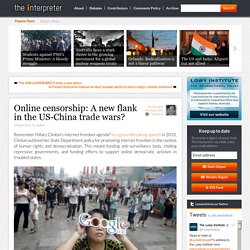
In a groundbreaking speech in 2010, Clinton outlined her State Department policy for promoting internet freedom in the context of human rights and democratisation. This meant funding anti-surveillance tools, chiding repressive governments, and funding efforts to support online democratic activism in troubled states. Although not untroubled, the policy marked Clinton's State Department as progressive and forward looking and championed the US' status as the birthplace of the web and the home of tech innovation.
This placed the US in stark contrast to countries which engaged in repressive online censorship — most clearly China and, at the time, Arab states racing to quash the online elements of what would become the Arab Spring. Since that speech, internet freedom faded from US foreign policy prominence. What’s Wrong with Twitter’s Latest Experiment with Broadcasting Favorites — The Message. Last month, I was invited to Twitter to give a talk.

Twitter has made a huge, positive difference in my life, and changed the landscape of politics in multiple countries I studied, including my home country, Turkey. So to start the conversation on a good footing, I opened my talk with this question: Who’s the true enemy of internet freedom - China, Russia, or the US? Recent reports that China has imposed further restrictions on Gmail, Google’s flagship email service, should not really come as much of a surprise.
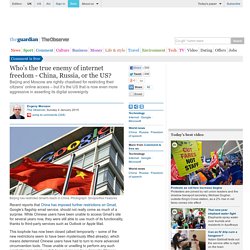
While Chinese users have been unable to access Gmail’s site for several years now, they were still able to use much of its functionality, thanks to third-party services such as Outlook or Apple Mail. This loophole has now been closed (albeit temporarily – some of the new restrictions seem to have been mysteriously lifted already), which means determined Chinese users have had to turn to more advanced circumvention tools.
Those unable or unwilling to perform any such acrobatics can simply switch to a service run by a domestic Chinese company – which is precisely what the Chinese government wants them to do. Such short-term and long-term disruptions of Gmail connections are part of China’s long-running efforts to protect its technological sovereignty by reducing its citizens’ reliance on American-run communication services.
Publications: Considerati. Publication date 01-04-2014 Publication date 10-03-2014 Online copyright is a special area of copyright law.
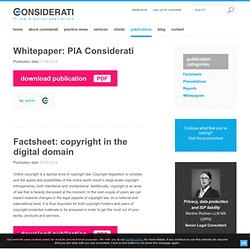
U.S. gives big, secret push to Internet surveillance. Senior Obama administration officials have secretly authorized the interception of communications carried on portions of networks operated by AT&T and other Internet service providers, a practice that might otherwise be illegal under federal wiretapping laws.
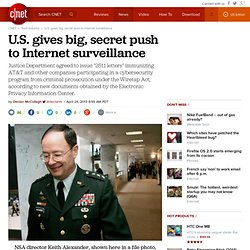
The secret legal authorization from the Justice Department originally applied to a cybersecurity pilot project in which the military monitored defense contractors' Internet links. Since then, however, the program has been expanded by President Obama to cover all critical infrastructure sectors including energy, healthcare, and finance starting June 12. "The Justice Department is helping private companies evade federal wiretap laws," said Marc Rotenberg, executive director of the Electronic Privacy Information Center, which obtained over 1,000 pages of internal government documents and provided them to CNET this week. The Plot to Block Internet Freedom - By Julius Genachowski and Lee C. Bollinger. The Internet has created an extraordinary new democratic forum for people around the world to express their opinions.
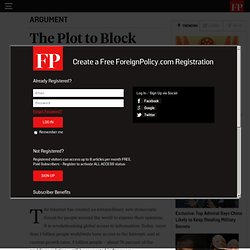
It is revolutionizing global access to information: Today, more than 1 billion people worldwide have access to the Internet, and at current growth rates, 5 billion people -- about 70 percent of the world's population -- will be connected in five years.
The Internet and Academic Freedom. Posner's Remarks on Internet Freedom and Responsibility, October 2011. Thank you very much for inviting me.
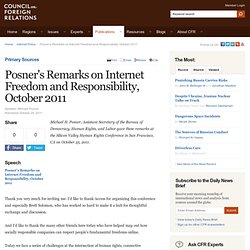
I’d like to thank Access for organizing this conference and especially Brett Solomon, who has worked so hard to make it a hub for thoughtful exchange and discussion. And I’d like to thank the many other friends here today who have helped map out how socially responsible companies can respect people’s fundamental freedoms online. Today we face a series of challenges at the intersection of human rights, connective technologies, business and government. It’s a busy intersection and a lot of people want to put up traffic lights.
Assistant Secretary Posner’s Speech on Internet Freedom. U.S.
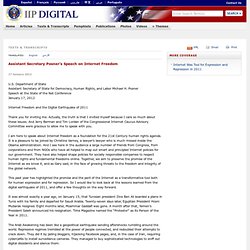
Department of State Assistant Secretary of State for Democracy, Human Rights, and Labor Michael H. Posner Speech at the State of the Net Conference January 17, 2012 Internet Freedom and the Digital Earthquake of 2011 Thank you for inviting me. Analysis: Index's experts assess Hillary Clinton's latest speech on internet freedom. By Index on Censorship / 16 February, 2011 In a major speech on internet freedom, US Secretary of State Hillary Rodham Clinton has warned governments not to restrict online liberty, while saying she opposed confidential leaks.

This comes in the midst of uprising and protest in Middle Eastern countries, and as the US attempts to gain access to Wikileaks members’ Twitter accounts. Index on Censorship consulted a number of experts for their verdict. Internet Freedom Starts at Home. "An electronic curtain has fallen around Iran," U.S.
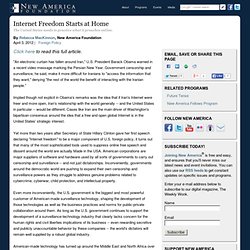
President Barack Obama warned in a recent video message marking the Persian New Year. Government censorship and surveillance, he said, make it more difficult for Iranians to "access the information that they want," denying "the rest of the world the benefit of interacting with the Iranian people. " Implied though not explicit in Obama's remarks was the idea that if Iran's Internet were freer and more open, Iran's relationship with the world generally -- and the United States in particular -- would be different. Cases like Iran are the main driver of Washington's bipartisan consensus around the idea that a free and open global Internet is in the United States' strategic interest. ITU Summit: What role will the U.N. play in governing the Internet? Photograph by Mario Tama/Getty Images This article arises from Future Tense, a joint effort of Arizona State University, the New America Foundation, and Slate that looks at emerging technologies and their implications for policy and for society.
On Thursday, Nov. 29, Future Tense will host an event in Washington, D.C., on the future of Internet governance. To learn more and to RSVP, visit the New America Foundation’s website. The event will also be streamed live. Ryan Gallagher is a journalist who reports on surveillance, security, and civil liberties. Follow. Soft-war dimension broader than hard war. Sat Dec 1, 2012 7:3PM GMT Arash Khalatbari, Press TV, Tehran Iran’s cyber-space is guarded and safe. Internet Freedom Starts at Home - By Rebecca MacKinnon. "An electronic curtain has fallen around Iran," U.S.
President Barack Obama warned in a recent video message marking the Persian New Year. Google resists two thirds of Aussie takedown requests - Security. Neelie Kroes Vice-President of the European Commission responsible for the Digital Agenda Internet Freedom Re:publica conference "The European public on the Net" Berlin, 4 May 2012. Neelie Kroes Vice-President of the European Commission responsible for the Digital Agenda Internet Freedom. Corporate Responsibility and Internet Governance.pdf (application/pdf Object)
OECD Adopts Internet Policy Making Principles. United States Mission to the OECD Office of Public Affairs Paris, France For Immediate Release December 13, 2011 United States Applauds OECD Adoption of Internet Policy Making Principles. State Department Supports Internet Freedom for Indians But Not WikiLeaks. Screen shot of State Dept. spokesperson Victoria Nuland during Aug. 21 press briefing The United States State Department has told India that it must respect Internet freedom, as the country threatens legal action against social media like Facebook, Google and Twitter that do not remove “inflammatory” content.” Internet censorship. Global Internet Freedom Consortium. Legislative overreach: The Philippine fight over internet freedom. “With freedom comes responsibility.”